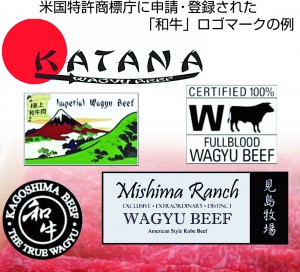Hana Saito, Masaru Yamada
25 beef brands including the word “wagyu” (meaning Japanese beef) are registered in the United States with 12 more filed under application as of Thursday, July 3, it was learned.
Beef dealers are becoming eager to register their brands as wagyu beef, as they see business chances in the increasing popularity of Japanese cuisine. The National Federation of Agricultural Co-operative Associations (JA Zen-Noh), which markets agricultural products made in Japan, has also applied for trademark registration of wagyu beef.
In the U.S., however, beef from wagyu-cross cattle is also marketed as wagyu beef. In order for Japan to promote U.S.-bound beef exports amid intensifying market competition, Japanese breeders must come up with a clear brand strategy to differentiate Japanese beef from American beef and make American consumers recognize the high quality of Japanese wagyu beef.
According to the U.S. Patent and Trademark Office database, there are 21 trademarks consisting of the term “wagyu,” excluding the one registered by a Japanese breeders’ association and those unrelated to beef. The brands include Certified 100% W Wagyu Beef, Wagyu Master, and Mishima Ranch Exclusive Extraordinary Distinct Wagyu Beef American Style Kobe Beef. 12 brands under application include Kagoshima Wagyu Beef the True Wagyu Beef from Japan. Aside from those brands, there are other brands applied for registration, such as Kobe Beef Brand Beef. Most applicants are American firms or individuals.

A variety of wagyu brand logos are registered or filed under application at the U.S. Patent and Trademark Office.
A California-based meat production company has filed an application to register the Kagoshima Wagyu brand. Its affiliated company, apparently specializing in sales, is likely to be planning to import beef from Kagoshima Prefecture and market the product under the brand name. An official at Kagoshima Meat Export Federation is surprised and says: “We have been working to register Kagoshima Wagyu beef under the trademark systems in East Asian countries, but we are not aware of the brand name being registered in the U.S.”
Katsuhiro Saka, a Ministry of Agriculture, Forestry and Fisheries official in charge of intellectual properties and new business creation, notes that such moves in the U.S. will not prevent beef producing regions in Japan from registering trademarks to market their brands there. “The U.S. system does not allow entities to claim exclusive rights as a trademark for words such as ‘wagyu,’ so it is possible for Japanese firms to register similar trademarks” if they use different fonts and logo designs, Saka says. Still, there is a risk of Japanese-grown wagyu beef getting lost in the flood of resembling brands when it is marketed in America.
In Japan, wagyu beef is strictly defined under a guideline set in 2007 as beef produced from fullblood or cross-breed cattle of four wagyu breeds such as Japanese Black and Japanese Brown, born and raised in Japan. In the U.S., however, beef can be defined as purebred wagyu if it is produced from cattle that are at least 93.75% Japanese wagyu blood, according to U.S. dealers. Even cross-breed of such wagyu breeds and Angus cattle is widely marketed in the country as wagyu beef.
“Wagyu is recognized as a premium beef by most Americans,” says Mark A. Hoegh, Partner and General Manager of Jackman Florida Wagyu Beef LLC which registered its beef as Rosewood Texas Raised Wagyu Beef in March. Hoegh says the company is new but plans to feed 1,200 cattle a year and sell the beef to high-end restaurants mostly in Texas.
Competition in the wagyu beef market in the U.S. is likely to heat up in the future. In order to expand beef exports to the U.S., Japanese firms must try to let American consumers realize how special the original Japanese wagyu beef is by conveying its high-quality flavor and tenderness, and telling them how it is served in Japan.
(July 4, 2014)

